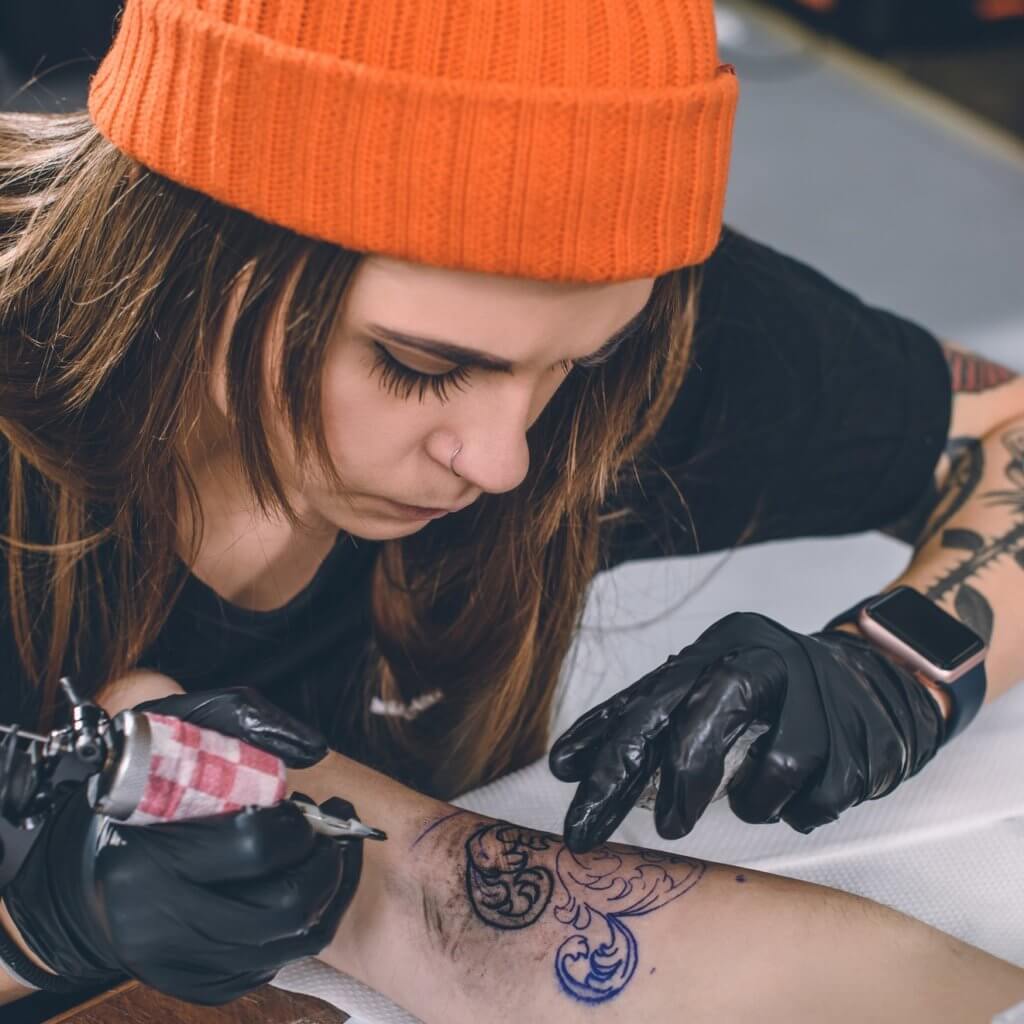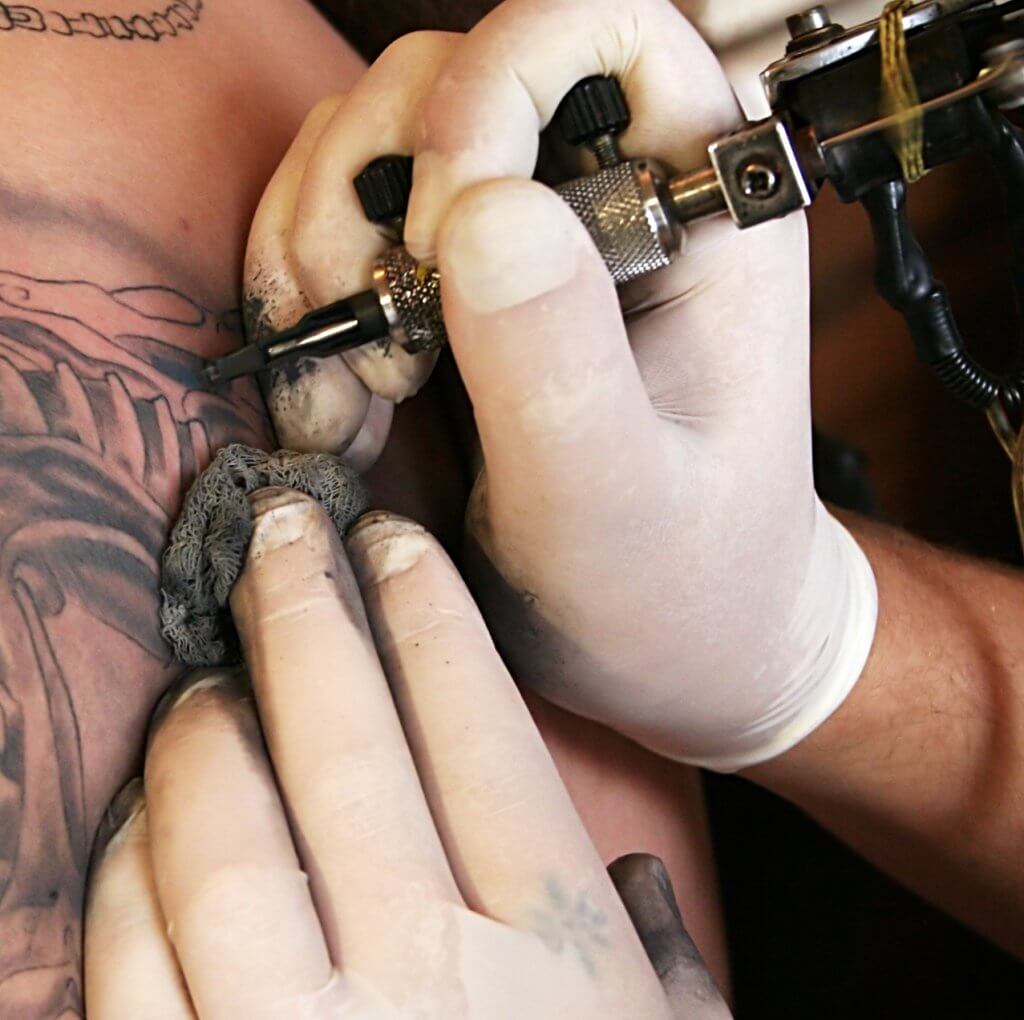An overview of the role
Tattoo artists use a wide range of specialised equipment to tattoo their clients. Some tattoo artists also design artwork for tattoos from scratch in accordance with their clients’ briefs.
The job, although hugely rewarding, is a taxing one. The best custom tattoo artists must work continuously in order to refine their style and develop a creative signature.
The role encompasses a wide range of skills beyond artistic talent and dexterity. Contemporary tattoo artists must also possess business acumen and marketing skills – successful artists advertise their work on social media platforms such as Instagram.
What are the responsibilities of a tattoo artist?
Responsibilities of a tattoo artist include:
- Consulting with clients
- Creating original artwork that realises a client’s vision
- Preparing and sanitising the client’s skin ready for tattooing
- Applying the design to the client’s body
- Tattooing the skin
- Sterilising all equipment
- Providing the client with all relevant information about caring for their tattoos

Tattoos have always held a fascination for me. There’s a great sense of achievement when you’ve finished a design.
Louis Molloy, Tattoo Artist 1
What are the key skills required by a tattoo artist?
Key skills for a tattoo artist include:
- Creativity and artistic ability
- Dexterity
- Attention to detail
- The ability to focus intensely for long periods of time
- Excellent customer service skills, communication and social ability
- A calm, reassuring demeanour
- Dedication, passion and persistence
- A detailed knowledge of all the relevant safety and hygiene requirements
What qualifications does a tattoo artist require?
You don’t need any academic qualifications in order to become a tattoo artist, although studies in fine art, illustration or graphic design may help you to hone your drawing skills – and to earn money while you train!
You will need to complete an apprenticeship or tattoo course so you can obtain a tattoo, piercing and electrolysis licence to work as a tattoo artist fulltime in the UK. You will also need evidence that you have been vaccinated against blood-borne pathogens such as hepatitis.
How much does a tattoo artist earn in the UK?
The national average salary for a tattoo artist is £27,845 per year. The hourly rate of a tattoo artist depends largely on your experience, skills and whether you work in a studio or on your own. As you gain experience and become a more established tattoo artist you can expect to see your hourly rate increase.
Do I need relevant work experience to become a tattoo artist?
In order to secure an apprenticeship, you will need to demonstrate your artistic experience with a portfolio of drawings.
Candidates are advised to showcase their ability by incorporating a wide variety of tattoo styles, such as:
- Old school (traditional/nautical)
- Neo-traditional
- Irezumi (traditional Japanese)
- New school
- Abstract
- Realist
- Tribal (Maori/Samoan/Polynesian)
- Geometric
- Three-dimensional
- Single line
- Dotwork
- Cartoon
- Stenciling
- Blackwork
- Sketch
- Biomechanical
- Trash polka
- Portraiture
- Watercolour
- Lettering/Script
These elements should be tied together, demonstrating your individual personality as a budding tattoo artist. Portfolios generally consist of at least 50 sketches and often as many as 200.
Tattoo artists looking at your portfolio will be paying attention to your shading ability, colour choice and awareness of dimension and scale. Your drawings should also showcase your ability to copy – as tattoo artists must replicate art onto their client’s skin freehand from the drawn design.
There’s a lot more going on than it appears, you’re gauging skin depth. Compensating for movement, for breathing, for pain.”
Jess Fitzgerald, Tattoo Artist 3
Is the role of a tattoo artist right for me?
There are both pros and cons involved in the role of a tattoo artist.
Pros of being a tattoo artist include:
- A rewarding, creative job.
- An excellent means of making money through art – the pay is good if you are diligent and persistent
- The role allows a personal and emotional connection with many clients, especially if doing custom work which may be based on clients’ moving life experiences
- Excellent potential to work for yourself or establish your own business should you choose to
- The role is flexible and you can more or less set your own schedule after you’re fully trained. This makes it easy to segue into the role of tattoo artist from your previous career, tattooing part time until you are making enough money to work full-time.
- If you decide to change careers or branch out and learn new tattooing techniques further down the line, you can specialise in medical or cosmetic tattooing. Your licence also covers piercings and you could train to be a professional piercer and work in both trades for a wider customer base and a more reliable source of income.
Cons of being a tattoo artist include:
- Tattoo artists generally make a small amount of money, or nothing for the first few years while they are training. Apprenticeships are usually unpaid and even when you start to make money, you will have to offer heavy discounts while you accumulate experience
- There is a fairly large upfront cost to tattooing as a career. You’ll need to buy all the equipment yourself, pay for licence fees and sometimes even your apprenticeship itself. This is due to the fact that training an apprentice takes an artist valuable time that could be spent on tattooing clients
- Repetitive strain injuries, such as tendonitis and back pain are widespread amongst tattoo artists
- The nature of a tattoo artist’s work is high-risk. Just one mistake could ruin your career or even make you liable for legal damages. Plenty of tattoo artists have been sued for making mistakes and there are branches of solicitors that specialise in tattoo compensation claims
- It is a difficult and competitive career to get into – apprenticeships are very limited and there are many budding tattoo artists. You will have to be determined as well as talented in order to secure a position
- All the usual negatives for working a custom-facing role apply – clients can be stressful, demanding, or not know what they want.
References:
1. .html https://www.independent.co.uk/student/career-planning/getting-job/i-want-your-job-tattoo-artist-464450.html
2. https://www.aol.com/2012/07/12/what-its-like-to-be-a-tattoo-artist/


